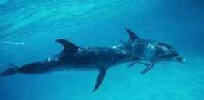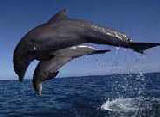|
Dolphins could become extinct in UK waters within 10 years
The report calls for immediate action to fundamentally change the way UK waters are managed.
One key recommendation is a raft of new marine laws and the establishment of a single government ministry with overall responsibility for ensuring marine resources are managed sustainably.
It says the number of dolphins drowned or injured in nets is dramatically increasing. This year a record number of 500 animals were stranded on our shores with post-mortem examinations revealing that the majority had been injured or drowned in nets.
In Cornwall the number and distribution of bottlenose dolphins indicates a serious decline of almost two thirds over the last 10 years.
With an estimated population of only 350 bottlenose dolphins resident in UK waters, the worst estimates of their extinction from our shores is 10 years.
Joan Edwards, Marine Policy Director of The Wildlife Trusts said: "The system of marine conservation in the UK is woefully deficient. The enormity of these problems demand immediate action and commitment from national and local Government to ensure effective protection of the marine environment."
A spokesman said many of the initiatives suggested by The Wildlife Trusts are already being taken forward in the package of initiatives announced in its first Marine Stewardship Report, Safeguarding our Seas, published in May.
"This provides a clear statement of our strategy for the conservation and sustainable development of our seas and how we are working to deliver a vision of clean, healthy, safe, productive and biologically diverse oceans and seas," he said.
"The Government recognises the sense of urgency expressed by this report, and welcomes the Wildlife Trusts' work to highlight these issues, but to develop a strategy to safeguard the marine environment for generations to come involves consultation and discussion with all stakeholders."
The Wildlife Trusts want the public to back their campaign for immediate Government action by writing to their local MPs.
BBC NEWS July 24 2002
|

